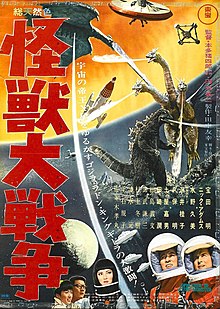| Invasion of Astro-Monster | |||||
|---|---|---|---|---|---|
 Theatrical release poster | |||||
| Japanese name | |||||
| Kanji | 怪獣大戦争 | ||||
| |||||
| Directed by | Ishirō Honda | ||||
| Special effects by | Eiji Tsuburaya | ||||
| Screenplay by | Shinichi Sekizawa | ||||
| Produced by | Tomoyuki Tanaka[1] | ||||
| Starring | |||||
| Cinematography | Hajime Koizumi[2] | ||||
| Edited by | Ryohei Fujii[2] | ||||
| Music by | Akira Ifukube[2] | ||||
Production companies | |||||
| Distributed by |
| ||||
Release dates |
| ||||
Running time | 94 minutes[3] | ||||
| Countries |
| ||||
| Language | Japanese[a] | ||||
| Budget | ¥132 million[7] | ||||
| Box office | $4.2 million (US/Japan rentals)[b] | ||||
Invasion of Astro-Monster (怪獣大戦争, Kaijū Dai-sensō, lit. 'The Great War of the Monsters')[1] is a 1965 kaiju film directed by Ishirō Honda, with special effects by Eiji Tsuburaya. It is the sixth film in the Godzilla franchise and Shōwa period. The film was a Japanese-American co-production; it was the second collaboration between Toho Co., Ltd. and UPA.[3][11][12] The film stars Akira Takarada, Nick Adams, Kumi Mizuno, Akira Kubo, and Yoshio Tsuchiya, with Haruo Nakajima as Godzilla, Masaki Shinohara as Rodan, and Shoichi Hirose as King Ghidorah. In the film, aliens plead with humanity to borrow Godzilla and Rodan to defeat Ghidorah, only to betray the humans and unleash the monsters on the Earth.
Invasion of Astro-Monster was theatrically released in Japan on December 19, 1965, to mixed reviews from critics. It was followed by a theatrical release in the United States on July 29, 1970, by Maron Films as Monster Zero, on a double bill with The War of the Gargantuas.
The film was followed by the seventh film in the Godzilla franchise, Ebirah, Horror of the Deep, released on December 17, 1966.[13]
- ^ a b Galbraith IV 1996, p. 292.
- ^ a b c Galbraith IV 1996, p. 293.
- ^ a b Ryfle 1998, p. 121.
- ^ a b Galbraith IV 2008, p. 225.
- ^ Galbraith IV 2007, 01:10:18.
- ^ Ryfle & Godziszewski 2017, p. 223.
- ^ Ryfle & Godziszewski 2017, p. 229.
- ^ "歴代ゴジラ映画作品一覧/年代流行". Nendai Ryuukou. Archived from the original on December 3, 2020. Retrieved December 2, 2020.
- ^ Cite error: The named reference
Japanwas invoked but never defined (see the help page). - ^ Ryfle 1998, p. 125.
- ^ Kalat 2010, p. 84.
- ^ Ryfle & Godziszewski 2017, p. 227.
- ^ Kalat 2010, p. 94.
Cite error: There are <ref group=lower-alpha> tags or {{efn}} templates on this page, but the references will not show without a {{reflist|group=lower-alpha}} template or {{notelist}} template (see the help page).